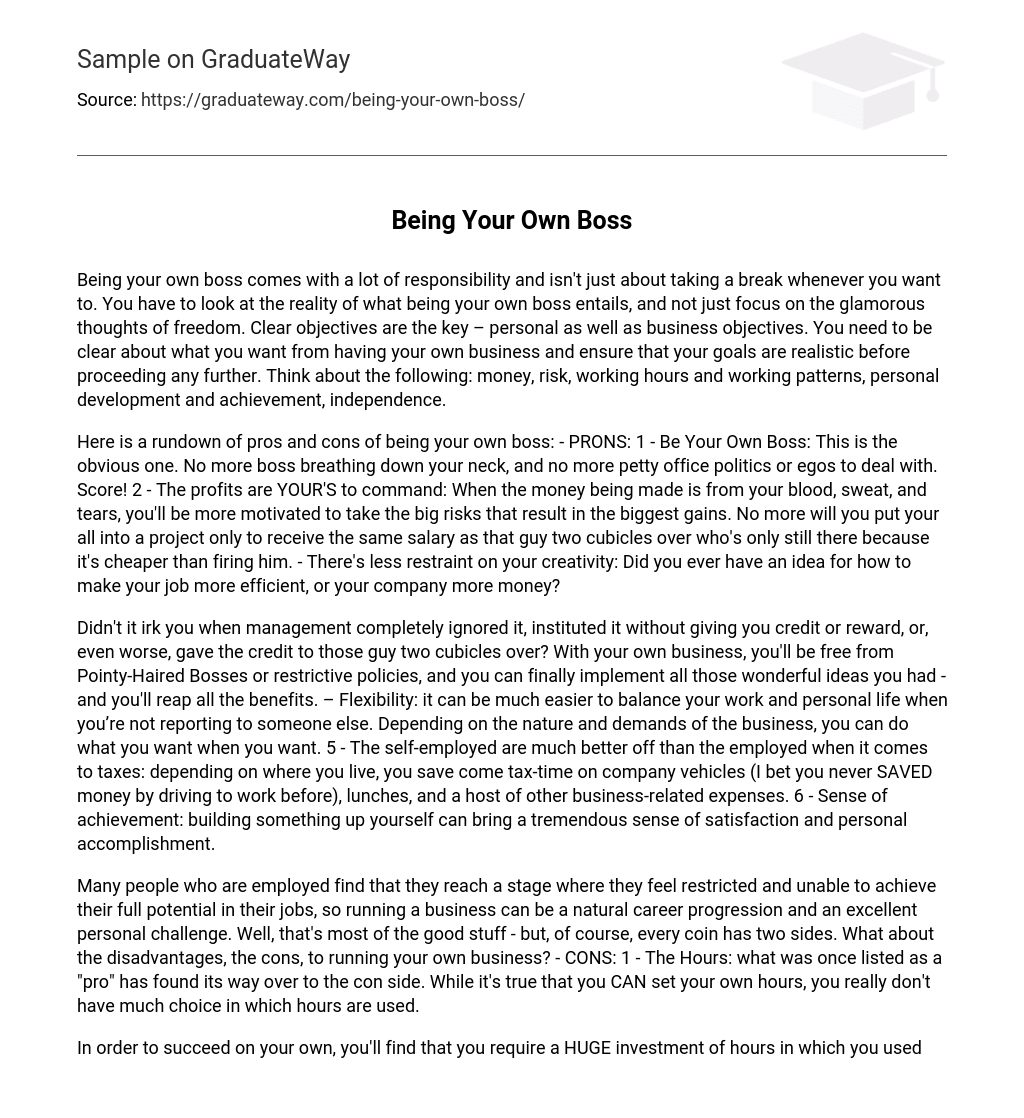Being your own boss comes with a lot of responsibility and isn’t just about taking a break whenever you want to. You have to look at the reality of what being your own boss entails, and not just focus on the glamorous thoughts of freedom. Clear objectives are the key – personal as well as business objectives. You need to be clear about what you want from having your own business and ensure that your goals are realistic before proceeding any further. Think about the following: money, risk, working hours and working patterns, personal development and achievement, independence.
Here is a rundown of pros and cons of being your own boss: – PRONS: 1 – Be Your Own Boss: This is the obvious one. No more boss breathing down your neck, and no more petty office politics or egos to deal with. Score! 2 – The profits are YOUR’S to command: When the money being made is from your blood, sweat, and tears, you’ll be more motivated to take the big risks that result in the biggest gains. No more will you put your all into a project only to receive the same salary as that guy two cubicles over who’s only still there because it’s cheaper than firing him. – There’s less restraint on your creativity: Did you ever have an idea for how to make your job more efficient, or your company more money?
Didn’t it irk you when management completely ignored it, instituted it without giving you credit or reward, or, even worse, gave the credit to those guy two cubicles over? With your own business, you’ll be free from Pointy-Haired Bosses or restrictive policies, and you can finally implement all those wonderful ideas you had – and you’ll reap all the benefits. – Flexibility: it can be much easier to balance your work and personal life when you’re not reporting to someone else. Depending on the nature and demands of the business, you can do what you want when you want. 5 – The self-employed are much better off than the employed when it comes to taxes: depending on where you live, you save come tax-time on company vehicles (I bet you never SAVED money by driving to work before), lunches, and a host of other business-related expenses. 6 – Sense of achievement: building something up yourself can bring a tremendous sense of satisfaction and personal accomplishment.
Many people who are employed find that they reach a stage where they feel restricted and unable to achieve their full potential in their jobs, so running a business can be a natural career progression and an excellent personal challenge. Well, that’s most of the good stuff – but, of course, every coin has two sides. What about the disadvantages, the cons, to running your own business? – CONS: 1 – The Hours: what was once listed as a “pro” has found its way over to the con side. While it’s true that you CAN set your own hours, you really don’t have much choice in which hours are used.
In order to succeed on your own, you’ll find that you require a HUGE investment of hours in which you used to watch your favorite television shows. As an employee, you may have worked 40 hours a week; as a self-employed entrepreneur, you can expect to spend 80 hours or more, and you aren’t even guaranteed that you’ll make any money! Which brings me to the next con… 2 – No Pay For You: as a young, self-employed go-getter, you only get to enjoy any money when your business is actually making it. Heck, most small start-ups don’t even turn a profit for the first year or two.
Keep this in mind when you start allocating funding for payroll and other expenses – after all, entrepreneurs got to eat. 3 – Failure: there’s a statistic floating around that says that four out of every five new businesses fail. I’m not sure that’s very accurate, but it sure as hell feels that way. Most entrepreneurs fail on their first go (the exceptions being folks like Mark Cuban), so it’s more likely than not that you’ll encounter this prospect. Don’t anticipate failure; just be warned that it’s very likely. – Stress, or, “It’s all on You, Atlas”: like the old god, you’ve got the whole world on your shoulders when you decide to work for yourself. It’s not going to be fun: you will be anxious, you will be worried, and you may even get a little paranoid, so if you can’t handle stress well, entrepreneurship may not be for you.
5 – Less job security: when you give up employment to set up in business by yourself, you stand to lose not only your job security but also the many perks that often come with working for another company uch as pension scheme, healthcare, corporate discounts and other financial bonuses. 6 – Multi-tasking: you’ll need to be a bit of a jack of all trades to make your business a success, especially in the early days if you’re the only person working for the company. This means being good at sales, marketing, administration and accounting, for example, as well as managing your core business. Be realistic about what your skills are and whether you’ll be able to run a company successfully.





